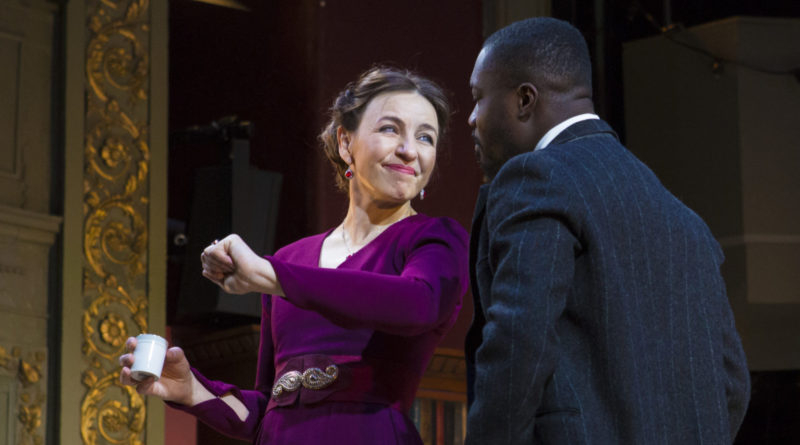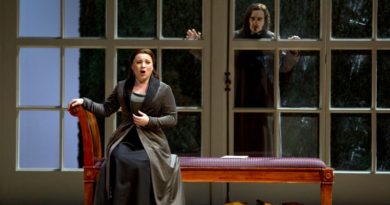The Cherry Orchard at Bristol Old Vic
Reading the Wiki entry of Anton Chekhov’s The Cherry Orchard on the train on the way to Bristol Old Vic, I thought it sounded dry. A play where, on the face of it, not much happens. Written moments before the dawn of Russia’s first (1905) Revolution, it is a treatise into the country’s class system and the huge change it was experiencing: the rise of lower classes at the expense of the upper and how the population dealt with that.
The story is set entirely at Ranyevskaya’s family estate, together with its encylopedically-huge cherry orchard, which, for reasons of finance, has to be sold. What will become of Ranyevskaya and her two daughters, Anya and Vavara, and for that matter their servants? Will peasant’s son, now rich merchant, Lopakhin (“Like a pig in a pastry shop … a peasant’s a peasant” he says) manage to buy the house and cut down the beloved orchard in the name of progress?
Get ready to experience two hours or so of deliciousness in a theatre whose beauty is thrust upon every person here and a set that uses part the stage to seat us, (some of) the audience. Facing out, we can see the whole auditorium – Tom Piper’s design allowing us to feel as though we’ve stepped back to some other period in the history of this Georgian theatre, the oldest continuously working theatre in the English-speaking world; we are truly ‘in the round’. Piper’s revolving set is minimal, props and furniture giving way to the cast and, given the quality of every actor here, that is a damned fine move! The interior of the house transforms to the orchard by the addition of a bench and a ladder, the very subtle falling of cherry blossom – not too much, always there – Colin Grenfell’s perfect lighting informing us of the time of day and year (in the summer, we can see the faces of the audience opposite us; so bright but never blinding is it).
The theme of change sits side-by-side with the feelings of grief and love. Lopakhin (Jude Owusu) has long and unrequitedly loved Ranyevskaya (Kirsty Bushell), a woman who still grieves the death of her little boy, a real child who appears as a ghost, forever present, reminding her. And us. Bushell will disappear in a trance-like state mid-sentence, smiling yet weeping at the memory of her drowned son and we understand. Her ability to change her facial features is knock out acting. Bushell’s counterpart and fellow lead, Owusu, plays the wealthy merchant with likeable swagger and surety, a touch of the spiv about him, and the pair revolve around each other with truthful chemistry.
There is no weak link on the Old Vic stage but a performance of note is Enyi Okoronkwo’s Trofimov, the student, who really comes into his own when he shows he understands exactly what is going on in that pre-communist country (“Mankind is moving towards a higher truth …”) – delivered with a passion that says “Follow me”.
Rory Mullarkey’s new translation and Michael Boyd’s direction ensure that this production of The Cherry Orchard is a comedy, as Chekhov intended, and it also feels throughly modern; class, privilege and change are relevant today and they may always be. Emma Cains’ costumes progress through the Twentieth Century with keen subtlety. Between them, the behind-the-scenes folk that we don’t see and the cast that we do, they make this a wholly fresh and immersive experience.
Captivating, exceptionally so, The Cherry Orchard plays at Bristol Old Vic until 7th April
Image by Jon Rowley, with thanks




